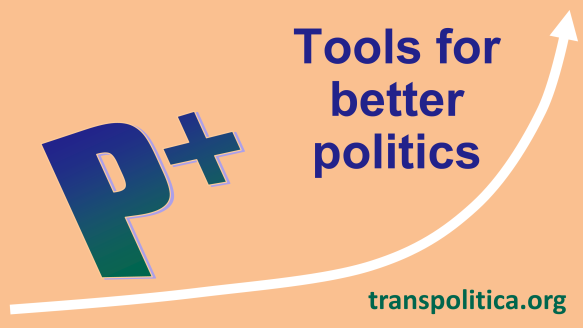Which solutions most deserve mention, in a list of “tools for better politics”?
As I’m reflecting on comments from reviewers of the draft chapters of the forthcoming book Transcending Politics, I’ve reached the view that I should add a new section, towards the end of the book, entitled “Tools well worth watching”.
This will fit well into Chapter 14, “Afterword”, which already contains a similarly-themed section “Communities well worth joining”.
If you have any suggestions or comments, either leave them in the Google Doc for Chapter 14, or as replies to this blogpost.
Ideally the list will include tools applicable to one or more of the systems described below (this is an extract from Chapter 1).
- Transparency systems, so that the activity of public organisations and decisions are visible, and can be judged more easily and accurately
- Fact-checking systems to determine more quickly and clearly, via an online lookup, if some information is misleading, deceptive, biased, or in any other way suspect or substandard
- Thinking training systems to help everyone understand and routinely practice the skills of critical thinking, hypothesis formulation and testing, and independent evaluation of sources
- Accountability systems to hold people and organisations to account whenever they pass on damaging misinformation – similar to how codes of conduct already operate in the fields of advertising and investment communications
- Bridging systems to encourage people with strong disagreements to nevertheless explore and appreciate each other’s points of view, so that shared values can be identified and a constructive dialog established
- Educational systems to keep politicians of all sorts informed, succinctly yet reliably, in timely fashion, about the trends that could require changes in regulations
- Simulation systems to help politicians of all sorts creatively explore possible new policy frameworks – and to gain a better idea in advance of likely positive and negative consequence of these new ideas
- Monitoring systems to report objectively on whether regulatory policies are having their desired effect
- Concentration systems to boost the ability of individual politicians to concentrate on key decisions, and to reach decisions free from adverse tiredness, distraction, bias, or prejudice
- Encouragement systems to encourage greater positive participation in the political and regulatory processes by people who have a lot to contribute, but who are currently feeling pressure to participate instead in different fields of activity.
One source of ideas, by the way, is the H+Pedia article on “Politics 2.0”.


Mr David Wood
I saw your thread in the u.s. transhumanist party group and thought I’d make a comment.
Just yesterday I was reading Chapter 11.!
An excellent read, very informative and nice pace.
I don’t have any immediate ideas about Tools For Better Politics at this point though I will give it some thought and get back if I have anything useful to share.
FYI:
The sentence above is confusing, “Ideally the list will include tools applicable to various (?) of the systems described below”
Cheers!
Dalton
________________________
Do you know about this website:
https://steemit.com/
Steemit is a social media platform where everyone gets paid for creating and curating content. It leverages a robust digital points system (Steem) for digital rewards.
Hi Dalton – I’m glad you enjoyed reading Chapter 11 of my book. Thanks again for the many useful comments you made on previous chapters. I’ve just rewritten the sentence in the blogpost which you had pointed out was confusing.
I have an account on Steemit and published a few articles there some time back. I’m planning to release excerpts of my book on Steemit in due course.